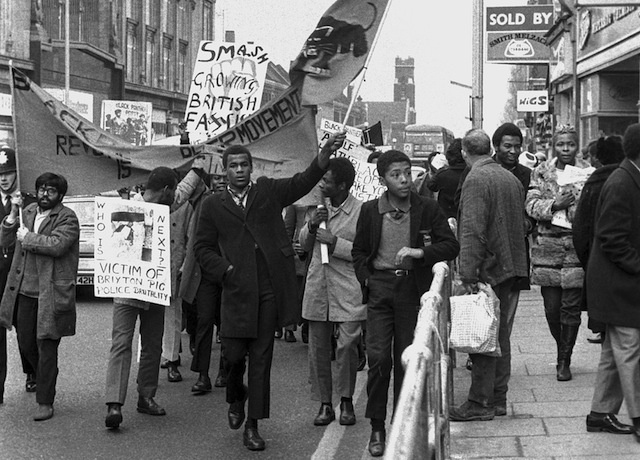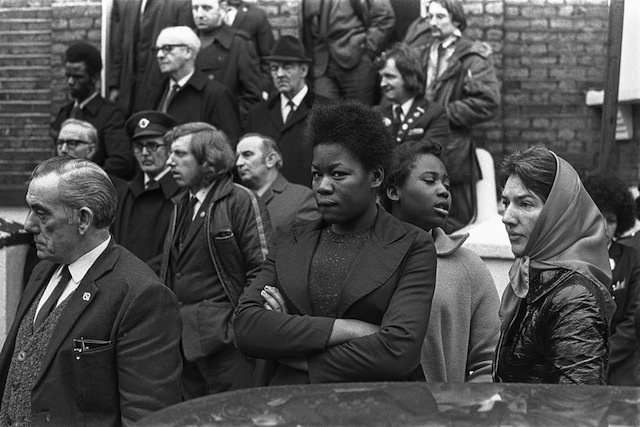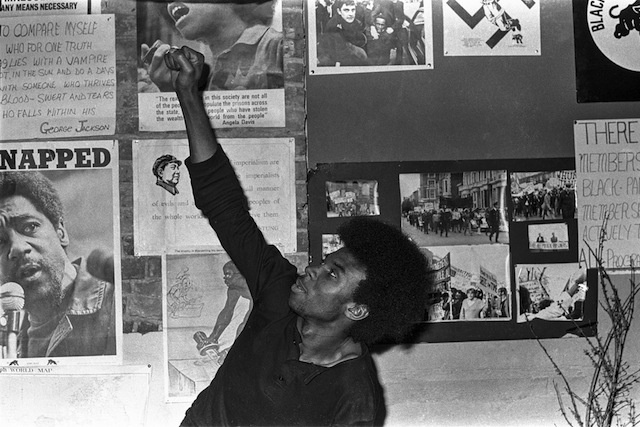After the Black Panther Party filled the vacuum left by the death of prominent human rights activists like Martin Luther King and Malcolm X, the movement's successes inspired others to create their own chapter. In the UK, The British Black Panthers, rather than being politically driven like its US counterpart, aimed for social change within its communities. But due to its brief four-year tenure as London’s resident countercultural grassroots movement, the movement was largely undocumented.Luckily, Neil Kenlock, one of the group's core members, took it upon himself to become their photographer, capturing images of their meetings, campaigns, marches, and presence in local communities.I had a chat with Neil about the British Black Panther movement, and the importance of documenting its legacy. All photos by Neil KenlockVICE: How did you become involved with the British Black Panther movement?
All photos by Neil KenlockVICE: How did you become involved with the British Black Panther movement?
Neil Kenlock: Well, I encountered racism when I was quite young—maybe 16 or 17. I went to a club in Streatham, and when I arrived I was told it was full and that I should come back next week. When I returned I was denied again because they didn't want "my type" in there. I protested that I didn't see why I shouldn't be let in. There were, of course, no discrimination laws in those days, so there was no one to tell about this.And you were never let in?
My friend and I pointed out that we were well dressed, weren't there to make trouble, and just wanted to enjoy ourselves like other people, so what was the problem? We were told to leave or the police would be called. We wouldn't go, so they called the police, who then told us that we weren't wanted in the club and that we should go home. I pointed out we weren't breaking any laws and the police told us they would arrest us if we didn't leave. I really didn't want my parents to have to come to Streatham police station and bail me out, so I left. But, on my way home, I decided that I was going to fight against unfairness and discrimination in this country.How did you come across the Panthers, then?
Well, some weeks later, I saw a Panther in Brixton giving out leaflets about police brutality and discrimination. I joined them then.Had you already been exposed to the American Black Panthers prior to that?
I'd seen them on TV and things, but I hadn't taken much notice. It might have flashed across my mind, but it wasn't really in my consciousness. It had more to do with what had happened to me, personally, and that I felt it was wrong. I saw them giving out those leaflets and thought, 'This is what I want to be—I want to fight against discrimination and racism and all the bad things that happen to us.' So I joined.When was that?
About 1968, just after I left school.And at that time how well organized was the movement? Was it a unified group or more ad hoc?
It was fairly organized. They had a building they were working from in Shakespeare Road, Brixton and a house in north London. They were having meetings, talking about history and all the societal systems—capitalism, socialism, all that stuff. They were teaching us things we weren't taught at school. Back then, we weren't taught any black history—we knew we'd been slaves, but there was no information about the struggles we had faced to get our freedom. We were taught to be proud of our history and color. Black people then weren't clear about themselves, they weren't strong, they were submissive. They believed in the establishment, society, and the system. Was the link between the British Black Panthers and the Black Panthers an official one? Or was the name informally adopted? I know, for instance, that you guys didn't condone gun use at all.
Was the link between the British Black Panthers and the Black Panthers an official one? Or was the name informally adopted? I know, for instance, that you guys didn't condone gun use at all.
It was just an adoption of the name. There was informal contact, but nothing on an official basis. They were a political, radical, and revolutionary party. We were a movement—we were never interested in gaining seats in Parliament or behaving like a political party. We were a movement aiming to educate our communities and to fight injustice and discrimination. That was our mantra. America was just coming out of segregation then, while we never had it. So there was a huge difference between our problems and theirs.What were the issues that the British Black Panthers were combating, specifically?
While we were another large black population, we had no segregation here. But it was difficult for us to get adjusted to this country, and there were cultural clashes for us, too. Our parents weren't given good jobs, only menial tasks and factory jobs—there were no real black professionals in Britain the time. The challenge here was to get a fair deal, and to get a chance to climb that ladder.There was also a cultural issue, and if I were to blame anyone for that it would be the British middle class and the political class, because they didn't educate the working-class British about the history of black people. They weren't told that we were taken from Africa, that we were actually slaves for this country for over 300 years. And at the end of slavery, plantation owners were compensated, while we got nothing, not even an apology. So, in those days, we believed we had a right to be in this country—we had helped build this country and we deserved some benefits from that. We felt we had a right to share in the profits, while British people felt, 'Why are they here taking our jobs?'So the Panthers were there to educate people about all that?
Yeah, the middle and political classes did nothing to explain the situation. That was what we were trying to get across—that we deserved to be here and we needed laws that reflected that. At the time, they were trying to repatriate us. It was outrageous—you can't take us from Africa, enslave us, and after we've built the country up after the war, tell us to go back. No. That's not on.How much did you interact with other rights groups? Anti-fascists, for example? Or were you fairly insular at the time?
We had some links with the Socialist Workers and other left-wing groups, and there were many intellectuals who were funding the Panthers—as well as actors and actresses and the like. Left-leaning people were supporting us. We weren't "racist" as such, but we decided that all our members should be black because we were there to educate and advance black people. We felt we needed to be able to sit together and talk about our situation and our history, and to do so in confidence without interruption.The British Black Panthers eventually dissolved into numerous other groups, was that intentional?
The British Black Panthers, in my opinion, came to be as a result of the discrimination that many students from the Commonwealth faced. Back then, the best students from the Commonwealth were sent to Britain to be educated. Many of those who associated with the Panthers were those sorts of people; they had never encountered discrimination in their own countries, where they were the sons or daughters of the middle classes. So when they got here for university, they discovered this inequality and decided to fight against that, but they needed support in our communities, so they came to Brixton and met people like me who shared these challenges, and we worked together.After we'd educated these students and our communities, lots of the students returned to their countries—in many cases to positions of leadership. We were left with lots of the things we'd been campaigning for actually being achieved. The repatriation bill was quashed, the idea of deportation was gone and the movement just dissolved—not in an organized way, but people just stopped coming around and stopped doing things. So the dissolving of the BBP was a reflection of its success, to an extent?
So the dissolving of the BBP was a reflection of its success, to an extent?
Yes. I think we helped to change the way we were perceived in this country. And many of those students who were set to return to the Commonwealth had good jobs waiting for them back home, in government, legal practice and so on—they no longer wanted to risk their future careers by being involved with us.What do you think the core legacy of the Panthers in Britain was?
It was a secretive movement, yet it had a great impact on discrimination in this country. The legacy is in all the proposed laws regarding deportation being quashed. We made sure the government was properly educating our children. Lots of black children back then were educated in subnormal schools—those things were quashed, too. It's a hidden story—that's why it's important that these photos exist. Without them, it would have been difficult to tell this story, especially to young people. The legacy of the photos themselves is important.Were you aware when taking these photos that they would become an important document in Britain's social history?
It was very conscious. When I joined the Panthers, it was a reaction to how I was treated. I felt that this was what I could do for the Panthers. I could record their meetings, their marches, and their efforts. It was a conscious contribution to the movement.Thanks.More photos from exceptional photographers:Jim Mangan and the Layers of the Utah DesertBill Ellis's Weird New YorkAlessandra Sanguenetti Photographs the Drama of the Countryside
ΔΙΑΦΗΜΙΣΗ

Neil Kenlock: Well, I encountered racism when I was quite young—maybe 16 or 17. I went to a club in Streatham, and when I arrived I was told it was full and that I should come back next week. When I returned I was denied again because they didn't want "my type" in there. I protested that I didn't see why I shouldn't be let in. There were, of course, no discrimination laws in those days, so there was no one to tell about this.And you were never let in?
My friend and I pointed out that we were well dressed, weren't there to make trouble, and just wanted to enjoy ourselves like other people, so what was the problem? We were told to leave or the police would be called. We wouldn't go, so they called the police, who then told us that we weren't wanted in the club and that we should go home. I pointed out we weren't breaking any laws and the police told us they would arrest us if we didn't leave. I really didn't want my parents to have to come to Streatham police station and bail me out, so I left. But, on my way home, I decided that I was going to fight against unfairness and discrimination in this country.
ΔΙΑΦΗΜΙΣΗ
Well, some weeks later, I saw a Panther in Brixton giving out leaflets about police brutality and discrimination. I joined them then.Had you already been exposed to the American Black Panthers prior to that?
I'd seen them on TV and things, but I hadn't taken much notice. It might have flashed across my mind, but it wasn't really in my consciousness. It had more to do with what had happened to me, personally, and that I felt it was wrong. I saw them giving out those leaflets and thought, 'This is what I want to be—I want to fight against discrimination and racism and all the bad things that happen to us.' So I joined.When was that?
About 1968, just after I left school.And at that time how well organized was the movement? Was it a unified group or more ad hoc?
It was fairly organized. They had a building they were working from in Shakespeare Road, Brixton and a house in north London. They were having meetings, talking about history and all the societal systems—capitalism, socialism, all that stuff. They were teaching us things we weren't taught at school. Back then, we weren't taught any black history—we knew we'd been slaves, but there was no information about the struggles we had faced to get our freedom. We were taught to be proud of our history and color. Black people then weren't clear about themselves, they weren't strong, they were submissive. They believed in the establishment, society, and the system.
ΔΙΑΦΗΜΙΣΗ

It was just an adoption of the name. There was informal contact, but nothing on an official basis. They were a political, radical, and revolutionary party. We were a movement—we were never interested in gaining seats in Parliament or behaving like a political party. We were a movement aiming to educate our communities and to fight injustice and discrimination. That was our mantra. America was just coming out of segregation then, while we never had it. So there was a huge difference between our problems and theirs.What were the issues that the British Black Panthers were combating, specifically?
While we were another large black population, we had no segregation here. But it was difficult for us to get adjusted to this country, and there were cultural clashes for us, too. Our parents weren't given good jobs, only menial tasks and factory jobs—there were no real black professionals in Britain the time. The challenge here was to get a fair deal, and to get a chance to climb that ladder.There was also a cultural issue, and if I were to blame anyone for that it would be the British middle class and the political class, because they didn't educate the working-class British about the history of black people. They weren't told that we were taken from Africa, that we were actually slaves for this country for over 300 years. And at the end of slavery, plantation owners were compensated, while we got nothing, not even an apology. So, in those days, we believed we had a right to be in this country—we had helped build this country and we deserved some benefits from that. We felt we had a right to share in the profits, while British people felt, 'Why are they here taking our jobs?'
ΔΙΑΦΗΜΙΣΗ
Yeah, the middle and political classes did nothing to explain the situation. That was what we were trying to get across—that we deserved to be here and we needed laws that reflected that. At the time, they were trying to repatriate us. It was outrageous—you can't take us from Africa, enslave us, and after we've built the country up after the war, tell us to go back. No. That's not on.How much did you interact with other rights groups? Anti-fascists, for example? Or were you fairly insular at the time?
We had some links with the Socialist Workers and other left-wing groups, and there were many intellectuals who were funding the Panthers—as well as actors and actresses and the like. Left-leaning people were supporting us. We weren't "racist" as such, but we decided that all our members should be black because we were there to educate and advance black people. We felt we needed to be able to sit together and talk about our situation and our history, and to do so in confidence without interruption.The British Black Panthers eventually dissolved into numerous other groups, was that intentional?
The British Black Panthers, in my opinion, came to be as a result of the discrimination that many students from the Commonwealth faced. Back then, the best students from the Commonwealth were sent to Britain to be educated. Many of those who associated with the Panthers were those sorts of people; they had never encountered discrimination in their own countries, where they were the sons or daughters of the middle classes. So when they got here for university, they discovered this inequality and decided to fight against that, but they needed support in our communities, so they came to Brixton and met people like me who shared these challenges, and we worked together.
ΔΙΑΦΗΜΙΣΗ

Yes. I think we helped to change the way we were perceived in this country. And many of those students who were set to return to the Commonwealth had good jobs waiting for them back home, in government, legal practice and so on—they no longer wanted to risk their future careers by being involved with us.What do you think the core legacy of the Panthers in Britain was?
It was a secretive movement, yet it had a great impact on discrimination in this country. The legacy is in all the proposed laws regarding deportation being quashed. We made sure the government was properly educating our children. Lots of black children back then were educated in subnormal schools—those things were quashed, too. It's a hidden story—that's why it's important that these photos exist. Without them, it would have been difficult to tell this story, especially to young people. The legacy of the photos themselves is important.
ΔΙΑΦΗΜΙΣΗ
It was very conscious. When I joined the Panthers, it was a reaction to how I was treated. I felt that this was what I could do for the Panthers. I could record their meetings, their marches, and their efforts. It was a conscious contribution to the movement.Thanks.More photos from exceptional photographers:Jim Mangan and the Layers of the Utah DesertBill Ellis's Weird New YorkAlessandra Sanguenetti Photographs the Drama of the Countryside
